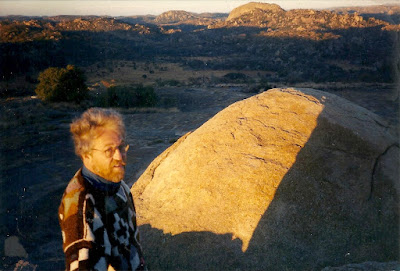FROG HOSPITAL -- July 26, 2015 -- unsubscribe anytime
Zimbabwe, 1997
An African Wedding. The
bride and her brothers stand with the groom -- that is -- me. Precious
has changed from her bridal gown to a festive red dress. Uncle Smiley is
striking a pose by leaning with cousin Tanti.
African wedding customs agreed with my own attitude. In Africa there is no concept of being single. It just doesn't exist. Everyone is married, and often. The idea of any solitary existence is simply too strange for Africans to understand.
Indoda is the word for man and the word for husband. A man is a husband and a father or he is not a man. Umfazi is the word for woman and wife. A woman is a wife and mother or she is not a woman.
Fifty
Matakas came to our house on the wedding day -- all cousins and
aunties, brothers, sisters, and a few friends. Precious didn't really
have many friends -- just tons of relatives. Fifty Matakas and me.
I
was so glad that Lieutenant Jones showed up, a neighbor, an officer in
the Zimbabwe National Army. He was a colored man and he stood for me --
the Best Man. Jones was half-white himself -- about the color of Barack
Obama -- and had that same even temperament.
The Matakas came to the house and the rented car waited in the driveway and Precious put on her beautiful white gown and veil.
The
wedding party was small. Lt. Jones drove the car. Mr. Mataka took the
honored front seat. Precious and I and her cousin Tanti squeezed into
the back seat.
We drove downtown, ten minutes from the
house, to the office of an Indian travel agent, but he was also a
Justice of the Peace and he kept a richly furnished wood-panelled court
room upstairs, where the vows were spoken and the documents were signed.
And then we drove back to the house. I was in a state of shock.
Did we actually do that? I was so glad Lt. Jones was there, otherwise I was all alone in a sea of fifty Matakas.
Did we actually do that? I was so glad Lt. Jones was there, otherwise I was all alone in a sea of fifty Matakas.
Jones'
wedding advice was clear -- "You must move far away because the Matakas
have a very large family. You cannot feed them, they will use all your
money and you will become poor."
This is exactly what
happened -- we did not move far enough away. The Matakas used all my
money and I became poor, but it took seven years and I don't want to get
into that. I'm trying to write a happy story -- the union of America
and Africa -- a bridge of understanding and love.
And there was love, but the understanding never came.
The
wedding day was marvelous. Everyone was happy and I was proud of my
house and my new family. Finally everybody left, piling into Mr. T's
overloaded pickup truck and Precious and I were left alone with a bottle
of brandy to face the future.
And there was love, but the understanding never came.






























